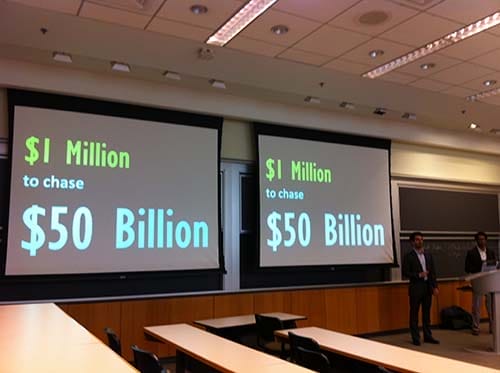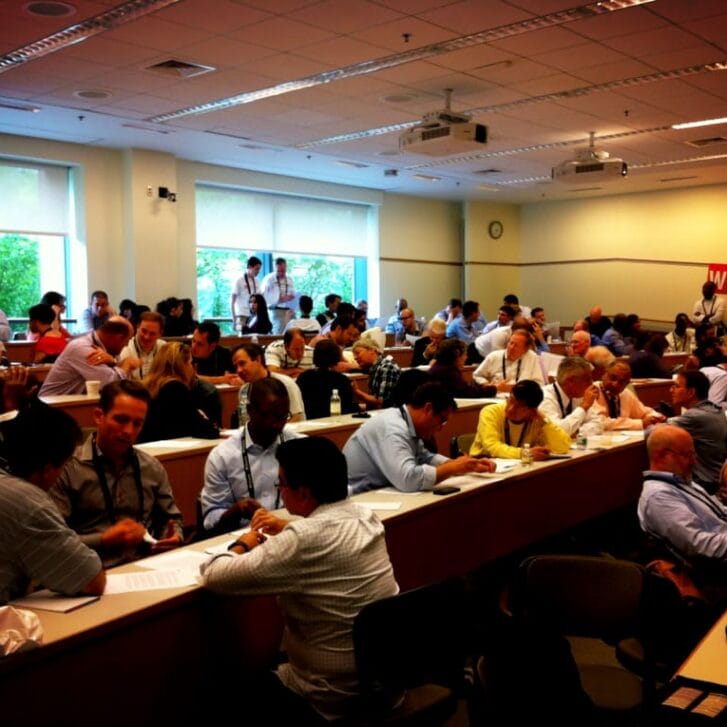The first thing you realize when you sit in on a pitch session in the Wharton Business Plan Competition Semi-Finals is how quickly five minutes pass. That is all the time each team had to present to the judges. The next thing you realize is that these judges don’t hold back. After the formal pitch, the judges ask questions and throw out advice in staccato succession for seven minutes, barely giving presenters time to find their footing and respond.
“You’re spraying everything,” one judge said about a team’s business plan.
“I don’t understand why it’s important to the sellers,” said another to a team.
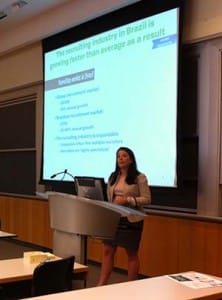
Lisa Lovallo, Hemishare
I had the privilege of watching how three teams (out of 26) fared against the judges during Semi-Finalist presentations on March 22.
One of the teams—Hemishare—was a team I followed during the first round of the Wharton BPC. (Read my story about its founder, second-year Lauder MBA/MA Lisa Lovallo, “A Day in the Life: Student Startups in This Year’s BPC.”)
For Lovallo, she knew that her business plan—a recruiting firm for Brazilian startups looking for North American talent, and vice versa—does not leverage a cool new technology that could be showcased in a couple of PowerPoint slides. Still, she managed to sell her business plan in five minutes and field questions from the few dozen judges in the room.
“I was prepared for all of the questions, but it was definitely hard to change directions every 30 seconds,” she told me afterward.
But she appreciated the judges’ feedback—“real-world filters,” she called it—and knew it would improve her business plan. Another benefit was the automatic networking within the Wharton community. One BPC participant asked for Lovallo’s information because he knows someone invested in Brazilian businesses.
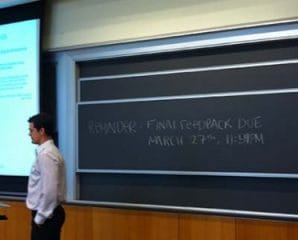
Bredesen (Brett) Lewis of SkylBridge awaits the judges’ questions
Another team, second-year MBAs Raj Jeyakumar and Bredesen (Brett) Lewis of SkylBridge—an online talent market where businesses can find top-notch freelance consultants for short-term projects—also appreciated the PR and positive feedback gained from the BPC. Jeyakumar noticed how judges got to the “next order” of questions, unlike other pitching experiences they have experienced in the pursuit of funding. They have also already experienced the benefits of the network; one of the judges mentioned in his feedback that he wants to connect SkylBridge with a recruiting firm.
Sadly, despite the overwhelming positive experience for all, only one team out of the three I witnessed got voted to move to the Finals. (Read about all eight of the 2013 Wharton Business Plan Competition Finalists.) They are second-year MBAs Jean-Mathieu (Jim) Chabas and Venkat Jonnala. Of course, it is happy days for them and their startup ZenKars, an online platform that allows consumers to buy used cars directly from corporate sellers.
Overall, the judges’ feedback has already been fruitful for them. Insights from the first round, for instance, helped ZenKars to double the size of their business plan.
Chabas reports that ZenKars has also participated in a Dreamit Ventures incubator, pitched to the Dorm Room Fund, applied for grants, and planned a West Coast trek in June to find angel and seed round investors. They already have a supply of cars lined up. They have shown what they can do, said Chabas, and now they just need more funding to go out and do it.
What would a win in the Wharton Business Plan Competitions Finals mean for ZenKar? It would be a “stamp of approval” for investors.
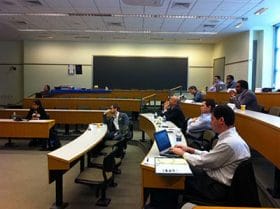
The judges
As for our two other teams—Hemishare and SkylBridge—they’ve earned a hearty pat on the back. We were disappointed that they didn’t move forward in the competition. Yet, do not fret too much for them. Both teams will be the first to tell you that the experience was a positive one, and that they planned to move their startups forward no matter what.
Wharton has been a “two-year incubator,” said SkylBridge’s Jeyakumar, and now he and partner Lewis are setting out to grow the business in the real world and are considering funding opportunities.
“The BPC has helped us make the first few steps. Now we need to figure out the rest of the path,” Jeyakumar said.
Editor’s note: Want to find out how the 2013 Wharton Business Plan Competition turned out? Who won? Watch our video, “ZenKars and the 2013 Wharton BPC: Student Entrepreneurs Day in the Life.”




















